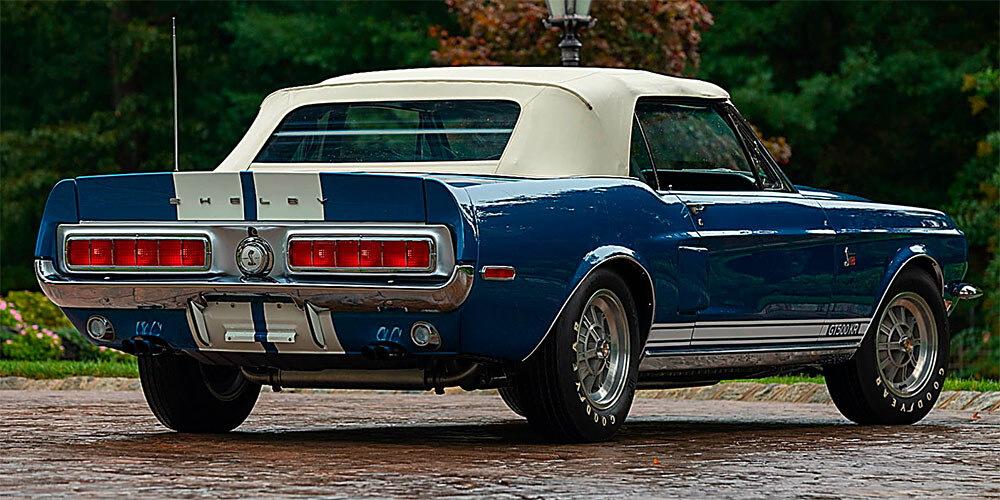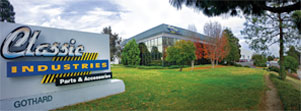
The vast majority of men and women in the old car hobby are doing something that is awesome with their free time. They're preserving history by restoring or restomodding old cars and giving them a second or third or fourth life. They're using their brains, and their hands, and their money, and their friends, and their families, and passionate professional builders they hire to create and renovate what was magical when it was new and now is superlative renewed and functional in current times.
Video: Pepsi Frank's 1967 GT500 Tribute to Music
C Code Fastback Turned into a Big Block GT500 Tribute

Above: To make sure the 428 mill keeps cool while running under load, there's a brass four-core radiator aided with an electric pusher fan in front of the radiator and a seven-blade fan (like all Shelby's) within a fan shroud. A 7.5-quart Moroso oil pan with a high volume oil pump keeps the big block V8 well lubricated. A Vintage Air HVAC system keeps the driver and passengers comfortable in the interior. Community Transmission, in Bellflower, CA, rebuilt the Ford C6 automatic transmission with competition clutches and a shift kit. A transmission cooler was also installed. The nine-inch third member has 3.0:1 gears, which makes for low RPM's cruising on the freeway.
When these works of rolling and running art from a bygone era are brought back to life, they can provide years of pleasure for the caretakers who have renovated them. In some cases, these vehicles become members of the family, albeit mechanical members, what with the years of time, talent, toil, busted knuckles, thrown wrenches, perhaps a fair bit of cussing, and greenbacks that went into their renewing. There are days of frustration and times of triumph when a project vehicle is underway and when the car or truck is finally back on the open road.

Franklin Holland & His Preference for Pony Cars
From speaking to Downey, CA resident and self-professed gearhead Franklin S. Holland on three separate rather time consuming (read longwinded, more so on Frank's side) occasions, yours truly deems him as an outgoing, intelligent sort of bloke, who has a larger-than-life sort of character and personality. Thankfully for the legion of vintage Mustang enthusiasts, he is also a big fan of all things pony car.

Above: The front bucket seat foam, the rear fastback seat foam, and the deluxe black vinyl seat upholstery was all purchased from Classic Industries.
Mr. Holland's Opus'es (Operas) Seem to be Preserving Pony Cars

Above: The overhead console/map light was a rare Factory option. The owner purchased the reproduction upper console. When Frank purchased the car four years ago, the Mustang included the lower console.
After a 40+ year career as a vending machine magnate in Southern California, one of Frank's most notable hobby's is finding first generation Mustangs and building them to be his. In the case of the Limestone Green 1967 Mustang fastback in these photos, she was a solid original specimen that Frank found about four years ago that was owned by the same person for 40 years. The Mustang originally had a 289 C-code V8 engine and was backed by the venerable C4 three-speed automatic Ford transmission. A C-code 289 translates to a two-barrel carburetor equipped small block V8 that is rated at 200-horsepower.

Above: A great place to hang your Rat Fink fire extinguisher is on the roll bar upright. The owner had to cut the rear panel on either side to accommodate the Tony Branda reproduction Shelby roll bar.
She was basically a rock-solid small block V8 powered Mustang fastback that Frank paid top dollar for, in spite of the fact that he had some sinister plans for the pony car's resurrection.

Above: Frank used House of Kolors epoxy primer and HK paint in Limestone Green and clear coats to magically match the existing body panels with the purchased Shelby fiberglass panels. The wheels are reproduction Shelby 10-spokes that are 17x8 inches in the front and the rear. The radial tires are 235/45R17's in the front and 235/50R17's in the rear. Shelby 10-spokes for the 1967-68 Shelby Mustangs were 15-inch wheels originally. The fiberglass Shelby quarter panel scoops and exterior sail panel scoops were scooped up (couldn't resist) at Classic Industries.
Pepsi Frank Plans a Shelby GT500 Transformation
By sinister, Cobra snakes are nice and sinister when the subject is first generation Mustang pony muscle machines. With the fastback tucked away in Mr. Holland's garage, the hunt for Shelby parts commenced apace. He had already sourced a 428-cubic inch big block V8 backed by a Ford C6 automatic trans and a Ford nine-inch rear end from the Wilmington, CA salvage yard some six years ago, which he pulled out of a 1967 Ford Galaxie 500. He paid the not so princely sum of $450 for all three of those well used items (which computes to the buy of the century)!

Above: The fiberglass hood has an air inlet scoop the same as 1967 Shelby GT350's and GT500's, but the air outlet vents with the turn signal lights incorporated in the front most louver on either side wasn't a Ford factory Shelby hood. It looks cool though and works well for extracting hot air from the engine bay, according to the owner.
New Components Procured from Various Sources - Including Classic Industries
For all the new restoration and performance parts required to finish the build, Pepsi Frank acquired numerous items from various well-regarded automotive aftermarket suppliers. After selling the cast iron 428-cylinder heads for $300, he bought a dual four-barrel polished aluminum intake manifold and aluminum cylinder heads for $2,600. He obtained a Scat rotating assembly to rebuild the 428- engine block, following a thorough cleaning, cylinder boring, surface smoothing, block decking, and balancing and blueprinting of new components before reassembling the engine. The new aluminum cylinder heads were ported and polished to fit the renewed 428 cast-iron engine block. Frank also had the cast-iron exhaust manifolds sandblasted, ceramic coated, and the mating surfaces shaved to ensure a good seal with the engine block sides.

Frank knows from experience that ceramic coated exhaust manifolds hold the heat inside better than exhaust headers do, which enables the engine's starter motor to have a prolonged life.

Above: Another great tip from Pepsi Frank is to fabricate a removable speaker box to accommodate your stereo speakers. By doing so you're not cutting into any Ford factory original kick panels or interior panels to mount your stereo speakers.
Body & Paintwork by the Owner
Though the Mustang's exterior was in fantastic shape, Frank would be installing many Shelby fiberglass body panels. This meant that he had to exactly match the Limestone Green paintwork that was already upon the car. As is evident in these photographs and when seeing the GT500 tribute in person, he did a fantastic job.

Above: Pepsi Frank installed all of the great Shelby items, including the pop open Shelby fuel filler cap and the Shelby taillight lens.
From his career of selling and servicing food and beverage vending machines in office and apartment complexes throughout Orange County, California, Mr. Holland earned the nickname of Pepsi Frank. In fact, he shared with yours truly that he trained Classic Industries' current vending machine supplier and servicer.

Above: The owner installed Global West upper and lower front control arms and Global West round pipe front subframe connectors. He boxed the lower control arms himself. There are Koni orange non-adjustable shock absorbers front and rear. Wilwood front disc brakes and 12-inch 1967 Ford Country Squire rear drum brakes provide plenty of Whoa Nelly stopping power for this snake enhanced pony car. He sourced a CPP rear sway bar from Classic Industries. A 1970 Mustang 26-gallon stainless steel fuel tank replaces the stock 16-gallon tank. Frank had to modify the fuel filler neck a bit to get the larger tank to fit.
Frank provided all the details of how he's able to paint his pony cars from within a homemade paint booth/tent within his home shop. He also revealed his tips and tricks for achieving pristine paint and bodywork on the cars that he builds. I came away from the phone interview concluding that Mr. Holland is as meticulous and creative with his old car hobby as he must have been in his career as a vending machine magnate. In fact, if local high schools and community colleges still offer auto shop classes, he would be a great teacher to the burgeoning old car hobbyists and professionals.
Classic Industries Has Pony Car Parts in Abundance - Whether a Real Shelby Mustang or a Clone

Should you be building a Mustang or a Shelby tribute, you may need some items for your favorite vehicle in your pony car paddock. In that instance, you can initiate your search for Ford Mustang parts online. You can also supplement your online parts search by also obtaining the Classic Industries' Mustang Parts & Accessories Catalog. By clicking the button just below, you'll be asked to fill in some shipping information. You can download a PDF version and/or have a printed catalog mailed to you. Happy hunting, shopping, building, driving, and enjoying your Ford Mustang and/or Shelby Mustang!
Classic Industries' Ford Mustang History Articles
We have a growing library of Ford Mustang and Shelby Mustang history articles available for your entertainment, education, and inspiration. Have fun in the CI library:
- Ford Mustang History: Creating the First Pony Car
- 4th Gen SN95 Mustang History: Development & "Fox 4" Concept Cars
- Fox Body Mustang: Development, Concepts, and 1979-1993 Year Changes
- 1964-1973 Ford Mustang VIN Decoder & Pre-Purchase Buyer's Guide
- 1964.5 (Early 1965) Mustang VIN & Data Plate Decoder
- The Wild Horse Galloped Away - 1969 Shelby GT350 Mustang Fastback
- Visiting the Segerstrom Shelby Event Center - Mr. Shelby is Smiling!
- Building & Driving a Factory Five Racing Mk4 1965 427SC Cobra Replica
- Decoding Your 1965 Ford Mustang's Data Plate & VIN
- 1967 Mustang Data Plate and VIN Decoder
- 1968 Mustang VIN Decoder - Data Plate and Build Sheet Insights





